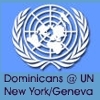

| BRIEFING - December 7, 2011 | To learn more about the Millenium Development Goals, click on the graphic Past Briefings: November 9, 2011 October 19, 2011 October 5, 2011 September 21, 2011 September 7, 2011 August 24, 2011 August 10, 2011 June 22, 2011 June 8, 2011 May 11, 2011 April 27, 2011 April 6, 2011 March 23, 2011 March 9, 2011 |
||
Honor rights of immigrants on Human Rights Day Dec. 10
As I am sure most of you know, this Advent the Dominican Family is commemorating the 500th anniversary of the homily preached by Friar Antonio Montesinos,OP, upholding the human rights and dignity of the indigenous peoples of the island of Hispaniola (modern-day Haiti and the Dominican Republic). While Montesinos is credited with the actual preaching, the content of the homily was the fruit of the prayer of his community of friars, who felt they could no longer remain silent in the face of the cruel and oppressive policies of the Spanish conquistadors. Their message was haunting, and is still relevant today:
Right here in the United States, we frequently find ourselves in polarized discussions regarding immigrants in our midst. We witness a government failing to muster the political will necessary to craft comprehensive immigration reform, with individual states filling the void by establishing their own, frequently draconian, immigration policies. And to our South, people die day-in-and-day-out, attempting to cross the border, in a desperate effort to earn a living for their impoverished families. What would Montesinos say today, regarding the treatment of these people? Thanks to one of my colleagues, I recently came across information from the organization NO MAS MUERTES–NO MORE DEATHS. Their web site describes their beginnings in these words:
Since 2006, NO MORE DEATHS has documented abuses endured by individuals in the custody of U.S. immigration authorities—in particular, the U.S. Border Patrol. They have recently published a report entitled “A Culture of Cruelty: Abuse and Impunity in Short-Term U.S. Border Patrol Custody,” which chronicles more than 30,000 cases of abuse and mistreatment at the hands of U.S. Border patrol personnel. The abuses are alarming, and consistent over the years: deprivation of water; denial of medical treatment for people suffering from life-threatening conditions; both adults and children beaten during apprehension, and while in custody; separation of family members; lack of any kind of due process; confiscation of property/belongings; lack of special considerations for juveniles. The response on the part of the Border Patrol has been consistent—denial—and any calls for reform have been ignored. NO MORE DEATHS has entitled its report “A Culture of Cruelty” “…because we believe our findings demonstrate that the abuse, neglect, and dehumanization of migrants is part of the institutional culture of the Border Patrol, reinforced by an absence of accountability mechanisms.” In summary, the most significant findings of the report indicate that:
Dec. 10 marks the 63rd Anniversary of the Universal Declaration of Human Rights. Eleanor Roosevelt considered her work on this declaration to be her greatest achievement. Shortly after its adoption by the UN General Assembly, she said:
The abuse of immigrants and the minimization of their human rights, whether in our own local neighborhoods or on our border with Mexico, is a blight on us all. As we celebrate Human Rights Day on Dec. 10, perhaps we could give some added attention to this issue and commit ourselves to be more pro-active in our advocacy on behalf of human rights and comprehensive immigration reform. Here are some websites that may be helpful to you:
In conclusion, as members of the Dominican Family, we proudly stand in a 500-year tradition of advocacy on behalf of human rights. I hope we can take to heart the Spirit-inspired words of Montesinos and his confreres, no less relevant today than they were 500 years ago, and draw strength and inspiration from them in our own efforts to help create a more just world.
|
Dominican Leadership Conference
Building relationships and collaborating in the mission of preaching the Gospel
29000 West Eleven Mile Road
Farmington Hills MI 48336
248-536-3234 Contact: Executive Director
